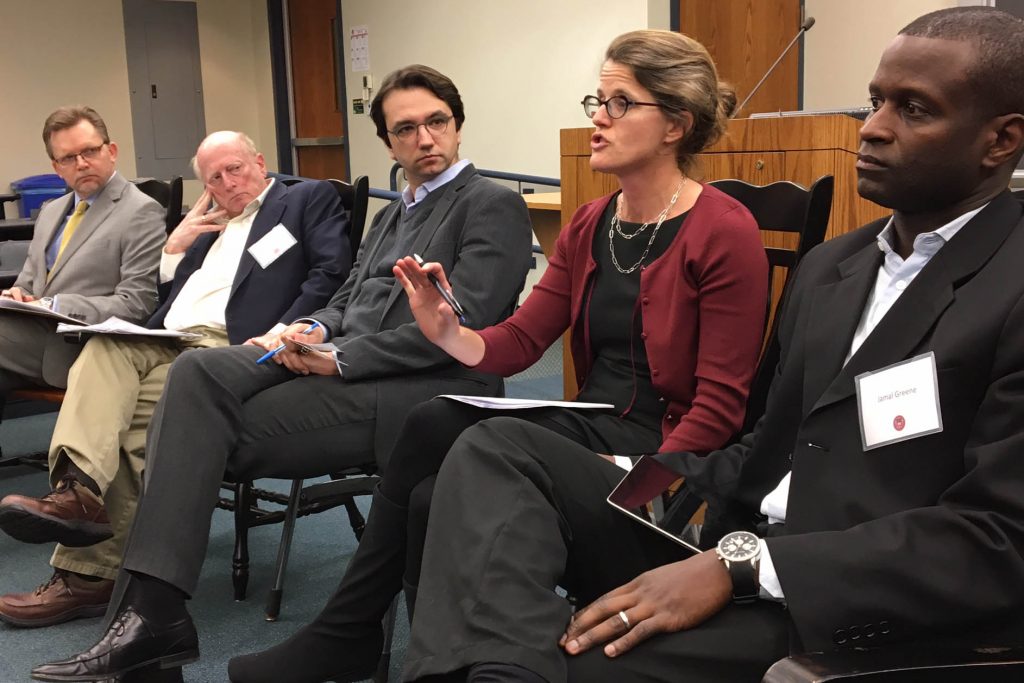In a spirited discussion, a panel of experts gathered at the Law School December 1 to outline what the future of constitutional law might look like under a Donald Trump presidency, covering subjects such a potential tiered system of citizenship, a massive shift in immigration policy, and a destabilized democracy.
The event, sponsored by BC’s Clough Center for the Study of Constitutional Democracy and moderated by its director BC Law Professor Vlad Perju, included leading scholars Mark Tushnet from Harvard University Law School, Kent Greenfield from BC Law, Kristin Collins from BU Law, and Jamal Greene from Columbia Law.
Saying the election was “the most seismic event of my lifetime,” Greenfield urged people to remain vigilant in the face of what he called Trump’s anti-constitutional views. “Trump does not show any deep thinking of any kind, much less about the constitution,” he said. Even worse, Greenfield added, is that “he does not know that he does not know.”
Tushnet expanded upon the possibilities of a more illiberal constitutional regime. Though shying away from a prediction, he said the “possibilities of that occurring are larger than months ago.” Under this view, the inherent equality of all persons would no longer be respected. The rights of foreigners and migrants, in particular, would be in jeopardy. Consequently, Tushnet theorized, the new administration might create a dual state system, whereby full citizens can enjoy the provisions of liberal constitutionalism, while everyone else would be subjected to second-class status. But the line between full and second status membership would be unclear and subject to revision and contestation.
In such a system, Tushnet continued, there would be a graduated scale for the protection of liberal constitutional rights, due process rights, free speech, and so on. The rights of full members to interact with others might be limited. In that sense, full membership would not insulate anyone from having his or her rights infringed upon.
Boston University’s Collins argued that there is already a structure of illiberal legislation that Trump could use to expand his powers. Under the plenary power doctrine, which gives the legislative and executive sole power in immigration matters, the new administration could undo many of the advances since the Civil Rights Act of 1965 ended the racial quota system for migrants.
She expressed concern that Trump will use the same tools for more explicitly illiberal aims. He has threatened to bring back race-based exclusion, and the courts will be unable to stop it. There are already laws passed after 9/11 that discriminate against the entry of Arab males. The new administration could comfortably expand on this legislation.
Where the new administration will find difficulties is in mass deportation. “We simply don’t have the machinery for this kind of policy,” she said. Nevertheless, “the constitutional culture that [might develop] is one of fear and vigilantism,” which could drive migrants away.
On an even darker note, Collins pointed to the real possibility that the new administration will craft legislation that masks its actual intentions and pass laws to revise birthright citizenship and move away from jus soli towards ethnic-based conceptions of citizenship.
For his part, Jamal Greene, of Columbia, explored how the current election and Trump’s personal flaws exposed the constitution’s deficiencies.
The constitution is not well equipped for the modern information age, he said. It does not have provisions for fact-manipulation the likes of which occurred during this election. Twitter and Facebook, but also the liberal and right media, feed an internal loop divorced from different perspectives. Greene argued that for Trump, truth does not matter; what matters only is how his actions are perceived. The constitution does not have a check for such manipulation of opinions.
Greene called this election an existential threat to our constitutional order that warranted a parallel to Weimar Germany. The Weimar Constitution was lauded as the most liberal in the 1920s, and only with Hitler’s rise did its deficiencies become apparent. Article 48 and its emergency powers proved to be a major flaw. Greene argued that we must look at defects within our own constitution or institutional process. One of them might be the “winner takes all system” of elections that has prevented other political opinions to make their claims heard.
Story by Felix A. Jiménez Botta
Pictured, left to right: Kent Greenfield, Mark Tushnet, Vlad Perju, Kristin Collins, and Jamal Greene.


